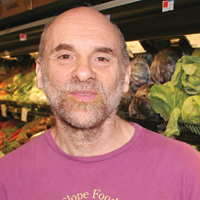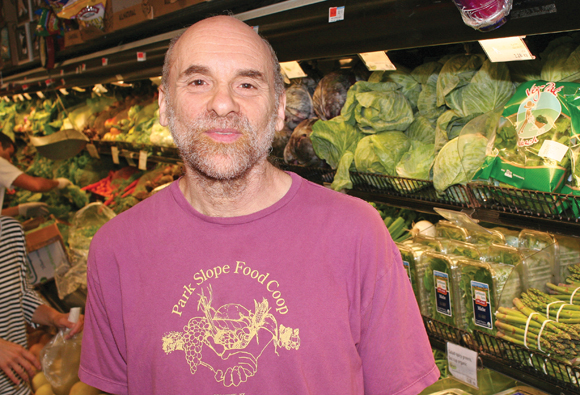 The last but certainly not least of the International Principles of Cooperation that guide the actions of cooperatives worldwide is concern for the community: “Cooperatives try to improve their communities by setting policies that benefit the neighborhood at large.” It’s a quality that the Park Slope Food Coop takes very seriously, and it’s one of the reasons why general manager Joe Holtz received this year’s Lovgren Professional Award for community service from the Park Slope Civic Council.
The last but certainly not least of the International Principles of Cooperation that guide the actions of cooperatives worldwide is concern for the community: “Cooperatives try to improve their communities by setting policies that benefit the neighborhood at large.” It’s a quality that the Park Slope Food Coop takes very seriously, and it’s one of the reasons why general manager Joe Holtz received this year’s Lovgren Professional Award for community service from the Park Slope Civic Council.
“The fact that we get an award from a community organization like the Civic Council means that we’re doing our job,” said Holtz, who with nine colleagues helped establish the Food Coop in 1973. “It was an honor for me, and it was an honor for the Coop.” Holtz received the award at the Civic Council’s general meeting in June. (Read more about the event and other honorees here.)
[pullquote]The neighborhood is great for the Coop, but I think the Coop is great for the neighborhood, too.[/pullquote]In 1975, just two years after the Coop took shape, Holtz became its first paid employee, in the role of general coordinator. Two decades later, he added the title of general manager, working with the coordinators to “make sure the Coop moves forward, especially if we’re deadlocked on an issue,” said the native Brooklynite and longtime Park Slope resident. Today, there are 68 staff members of the Coop, including nine general coordinators.
The goal of the Food Coop has always been to “get good food and make it affordable, and let’s get people to work together and cooperate, and help build a community,” Holtz noted. “And let’s try to do that really well.”
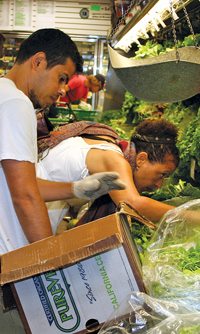 That philosophy has helped the Coop thrive. After all, it’s not just the full-time staff that has grown — membership has reached about 16,000 (up from 5,000 just a decade ago), all of whom are required to work a 2.75-hour shift every four weeks so they can shop the well-stocked, often crowded store. Average sales per square foot at the Coop are 12 times the national average for a grocery store.
That philosophy has helped the Coop thrive. After all, it’s not just the full-time staff that has grown — membership has reached about 16,000 (up from 5,000 just a decade ago), all of whom are required to work a 2.75-hour shift every four weeks so they can shop the well-stocked, often crowded store. Average sales per square foot at the Coop are 12 times the national average for a grocery store.
The local institution has been a strong force for a better neighborhood: encouraging environmental responsibility (its produce, for example, is often organic and locally grown; it offers recycling for usually nonrecyclable plastics); livable streets (a Sunday bicycle valet program encourages shoppers to travel to the Coop by bike); and community service. Members can work their shifts on such neighborhood-friendly activities as the Civic Council’s Civic Sweeps and at the CHIPS soup kitchen.
Cart walkers — perhaps the most visible job to the public because of their work outside, their day-glow vests, and the noisy carts they haul — illustrate how the Food Coop strives to help its neighbors. The need for this task “boils down to two words: fire safety,” Holtz said. Shoppers who drive to the Coop would often double-park to load their cars. That made it difficult if not impossible for emergency vehicles to leave Squad 1’s firehouse, located next door. “We were going to be responsible eventually for the fire truck not saving someone’s life,” he said. “We told members who chose to drive not to bring their car out front.” Workers walk shoppers to their cars with their groceries, “and then we’ll bring your cart back. Eventually, we made it both a car-delivery and home-delivery program.
“We try to be responsible. Hopefully any business would figure that out, especially if you’re a busy business.”
The Food Coop was founded with two main purposes: First and foremost, was to help people afford really good food by using member labor to bring down costs. “We also felt that there was a lot of effort in our society to focus on individual success. There’s nothing wrong with that,” Holtz said, “but there should be community success, too. A lot of the founders felt strongly that this was a community-building thing, and it was good to have a collective community success built on cooperation.
“The neighborhood is great for the Coop,” he commented, “but I think the Coop is great for the neighborhood, too. Not just because we help with the Civic Sweep. I think the Coop has grown to the point where we bring people into the neighborhood, and I think that’s good for the business community.” Today, the Food Coop draws people from Park Slope and elsewhere, especially from the several neighborhoods within walking distance of the Union Street location, including Crown Heights, Prospect Heights, Carroll Gardens, Boerum Hill, and Fort Greene.
Holtz has also made a point of helping other food coops succeed. Locally, he is working with new cooperatives in Bay Ridge, Prospect Lefferts Gardens, Bushwick, Fort Greene/Clinton Hill, and Bedford-Stuyvesant. “It’s important to help because of another guiding principle of cooperation: to help other coops. We think we have an obligation to help those people form a coop. We also believe coops are good for people and that there should be more of them.
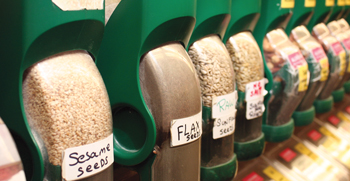 “There’s also a selfish reason,” he added. Membership in the Park Slope institution has been growing by leaps and bounds, but the store’s capacity can’t. “If we could get other coops to start, we would have less pressure on us from people who want to join our Food Coop.”
“There’s also a selfish reason,” he added. Membership in the Park Slope institution has been growing by leaps and bounds, but the store’s capacity can’t. “If we could get other coops to start, we would have less pressure on us from people who want to join our Food Coop.”
The Coop has been working with start-ups around the nation, most recently in Chester, Pa., just south of Philadelphia, and in Missoula, Mont. “We’re very supportive of these coops — they can visit, we can help them find a place to stay — and we’re very free with our time for that.”
Holtz enjoys being a general manager of the Food Coop and a member, too. In his full-time role, his greatest pleasure is to see members begin to understand what a cooperative truly means. “It’s great to see someone come into the Coop who doesn’t really ‘get it’ — they’re joining just to save money but they don’t get the idea that this is theirs, they’re an owner, that they can get involved and have a say. They can stop using the word they and start using we when they refer to the Coop. It’s great to see that conversion.”
As for being a member, the best part is the great food. “I love the food that comes from the local farms that take care of their land and nurture their soil, and the food tastes even better. I love that I can buy a cucumber here in August that tastes like candy. The Coop has been very careful about the food and makes many correct choices about the food, and I get to benefit from that as a member.”
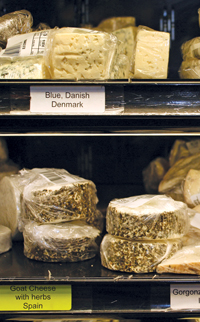 Holtz also likes to see people working together for a better community. “There’s so much opportunity to be isolated in our American life,” he said. “I think we’re social beings, and some people get out of touch with that. To be at a Civic Council meeting or see people working in local gardens [which the Food Coop supports with composting assistance], all those things make the neighborhood richer and make the people richer.”
Holtz also likes to see people working together for a better community. “There’s so much opportunity to be isolated in our American life,” he said. “I think we’re social beings, and some people get out of touch with that. To be at a Civic Council meeting or see people working in local gardens [which the Food Coop supports with composting assistance], all those things make the neighborhood richer and make the people richer.”
One concern of his is how expensive Park Slope has become for people who want to live or run a business here. “Good people who benefited from changes in the neighborhood [over the last 30-plus years] may have to move out of the neighborhood because they can’t economically afford it,” he said. Also, “I don’t want stores that offer needed services go and be replaced by something we already have. … I’m not saying I know how to do anything about that, but it would be nice if the costs of being in the neighborhood, whether as a business or as an individual family, would stop going up.”
Meanwhile, the Food Coop is prospering, and seems likely to remain so for years to come. “I do want to encourage the members to have a robust discussion about the future of the Coop,” he commented. “Like should we open up a branch someday? If so, when? Where? Why? Would it hurt the other coops that are opening to blossom? A lot of times, businesses have to improve, but I don’t think businesses have to expand to survive.
“I want to keep improving the Coop,” Holtz concluded. “I’m always interested in having it make sense in as many people’s lives as possible.”
— Written and photographed by David Herman
from the Summer 2011 Civic News

